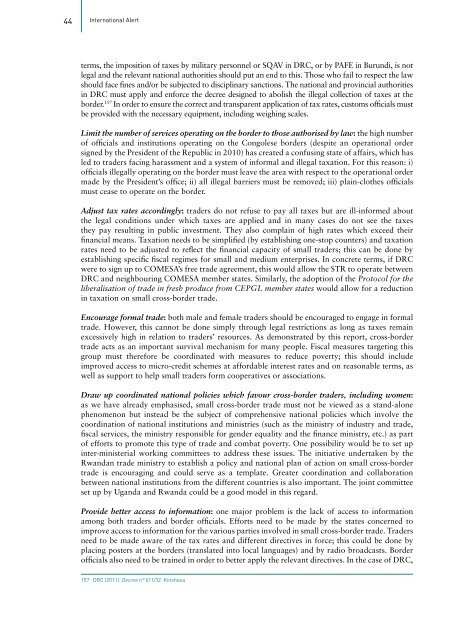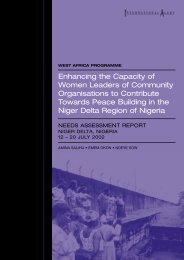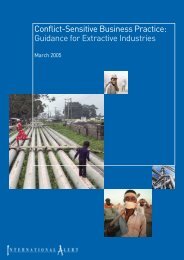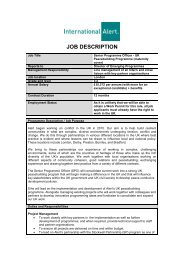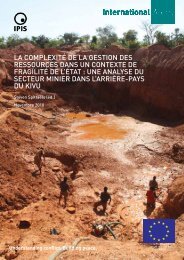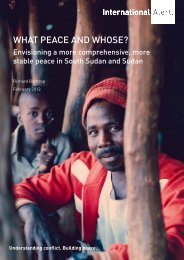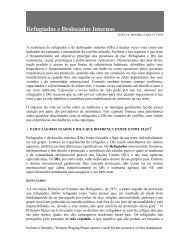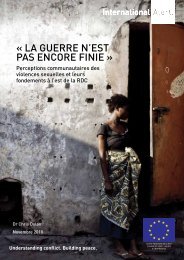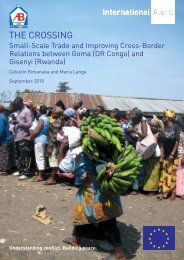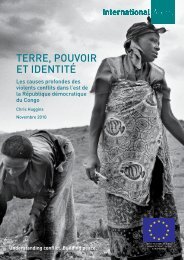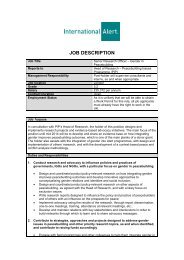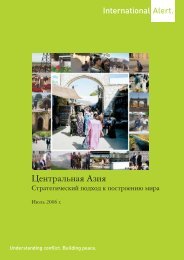Walking in the Dark: informal Cross-border trade ... - International Alert
Walking in the Dark: informal Cross-border trade ... - International Alert
Walking in the Dark: informal Cross-border trade ... - International Alert
You also want an ePaper? Increase the reach of your titles
YUMPU automatically turns print PDFs into web optimized ePapers that Google loves.
44 <strong>International</strong> <strong>Alert</strong><br />
terms, <strong>the</strong> imposition of taxes by military personnel or SQAV <strong>in</strong> DRC, or by PAFE <strong>in</strong> Burundi, is not<br />
legal and <strong>the</strong> relevant national authorities should put an end to this. Those who fail to respect <strong>the</strong> law<br />
should face f<strong>in</strong>es and/or be subjected to discipl<strong>in</strong>ary sanctions. The national and prov<strong>in</strong>cial authorities<br />
<strong>in</strong> DRC must apply and enforce <strong>the</strong> decree designed to abolish <strong>the</strong> illegal collection of taxes at <strong>the</strong><br />
<strong>border</strong>. 157 In order to ensure <strong>the</strong> correct and transparent application of tax rates, customs officials must<br />
be provided with <strong>the</strong> necessary equipment, <strong>in</strong>clud<strong>in</strong>g weigh<strong>in</strong>g scales.<br />
Limit <strong>the</strong> number of services operat<strong>in</strong>g on <strong>the</strong> <strong>border</strong> to those authorised by law: <strong>the</strong> high number<br />
of officials and <strong>in</strong>stitutions operat<strong>in</strong>g on <strong>the</strong> Congolese <strong>border</strong>s (despite an operational order<br />
signed by <strong>the</strong> President of <strong>the</strong> Republic <strong>in</strong> 2010) has created a confus<strong>in</strong>g state of affairs, which has<br />
led to <strong>trade</strong>rs fac<strong>in</strong>g harassment and a system of <strong>in</strong>formal and illegal taxation. For this reason: i)<br />
officials illegally operat<strong>in</strong>g on <strong>the</strong> <strong>border</strong> must leave <strong>the</strong> area with respect to <strong>the</strong> operational order<br />
made by <strong>the</strong> President’s office; ii) all illegal barriers must be removed; iii) pla<strong>in</strong>-clo<strong>the</strong>s officials<br />
must cease to operate on <strong>the</strong> <strong>border</strong>.<br />
Adjust tax rates accord<strong>in</strong>gly: <strong>trade</strong>rs do not refuse to pay all taxes but are ill-<strong>in</strong>formed about<br />
<strong>the</strong> legal conditions under which taxes are applied and <strong>in</strong> many cases do not see <strong>the</strong> taxes<br />
<strong>the</strong>y pay result<strong>in</strong>g <strong>in</strong> public <strong>in</strong>vestment. They also compla<strong>in</strong> of high rates which exceed <strong>the</strong>ir<br />
f<strong>in</strong>ancial means. Taxation needs to be simplified (by establish<strong>in</strong>g one-stop counters) and taxation<br />
rates need to be adjusted to reflect <strong>the</strong> f<strong>in</strong>ancial capacity of small <strong>trade</strong>rs; this can be done by<br />
establish<strong>in</strong>g specific fiscal regimes for small and medium enterprises. In concrete terms, if DRC<br />
were to sign up to COMESA’s free <strong>trade</strong> agreement, this would allow <strong>the</strong> STR to operate between<br />
DRC and neighbour<strong>in</strong>g COMESA member states. Similarly, <strong>the</strong> adoption of <strong>the</strong> Protocol for <strong>the</strong><br />
liberalisation of <strong>trade</strong> <strong>in</strong> fresh produce from CEPGL member states would allow for a reduction<br />
<strong>in</strong> taxation on small cross-<strong>border</strong> <strong>trade</strong>.<br />
Encourage formal <strong>trade</strong>: both male and female <strong>trade</strong>rs should be encouraged to engage <strong>in</strong> formal<br />
<strong>trade</strong>. However, this cannot be done simply through legal restrictions as long as taxes rema<strong>in</strong><br />
excessively high <strong>in</strong> relation to <strong>trade</strong>rs’ resources. As demonstrated by this report, cross-<strong>border</strong><br />
<strong>trade</strong> acts as an important survival mechanism for many people. Fiscal measures target<strong>in</strong>g this<br />
group must <strong>the</strong>refore be coord<strong>in</strong>ated with measures to reduce poverty; this should <strong>in</strong>clude<br />
improved access to micro-credit schemes at affordable <strong>in</strong>terest rates and on reasonable terms, as<br />
well as support to help small <strong>trade</strong>rs form cooperatives or associations.<br />
Draw up coord<strong>in</strong>ated national policies which favour cross-<strong>border</strong> <strong>trade</strong>rs, <strong>in</strong>clud<strong>in</strong>g women:<br />
as we have already emphasised, small cross-<strong>border</strong> <strong>trade</strong> must not be viewed as a stand-alone<br />
phenomenon but <strong>in</strong>stead be <strong>the</strong> subject of comprehensive national policies which <strong>in</strong>volve <strong>the</strong><br />
coord<strong>in</strong>ation of national <strong>in</strong>stitutions and m<strong>in</strong>istries (such as <strong>the</strong> m<strong>in</strong>istry of <strong>in</strong>dustry and <strong>trade</strong>,<br />
fiscal services, <strong>the</strong> m<strong>in</strong>istry responsible for gender equality and <strong>the</strong> f<strong>in</strong>ance m<strong>in</strong>istry, etc.) as part<br />
of efforts to promote this type of <strong>trade</strong> and combat poverty. One possibility would be to set up<br />
<strong>in</strong>ter-m<strong>in</strong>isterial work<strong>in</strong>g committees to address <strong>the</strong>se issues. The <strong>in</strong>itiative undertaken by <strong>the</strong><br />
Rwandan <strong>trade</strong> m<strong>in</strong>istry to establish a policy and national plan of action on small cross-<strong>border</strong><br />
<strong>trade</strong> is encourag<strong>in</strong>g and could serve as a template. Greater coord<strong>in</strong>ation and collaboration<br />
between national <strong>in</strong>stitutions from <strong>the</strong> different countries is also important. The jo<strong>in</strong>t committee<br />
set up by Uganda and Rwanda could be a good model <strong>in</strong> this regard.<br />
Provide better access to <strong>in</strong>formation: one major problem is <strong>the</strong> lack of access to <strong>in</strong>formation<br />
among both <strong>trade</strong>rs and <strong>border</strong> officials. Efforts need to be made by <strong>the</strong> states concerned to<br />
improve access to <strong>in</strong>formation for <strong>the</strong> various parties <strong>in</strong>volved <strong>in</strong> small cross-<strong>border</strong> <strong>trade</strong>. Traders<br />
need to be made aware of <strong>the</strong> tax rates and different directives <strong>in</strong> force; this could be done by<br />
plac<strong>in</strong>g posters at <strong>the</strong> <strong>border</strong>s (translated <strong>in</strong>to local languages) and by radio broadcasts. Border<br />
officials also need to be tra<strong>in</strong>ed <strong>in</strong> order to better apply <strong>the</strong> relevant directives. In <strong>the</strong> case of DRC,<br />
157 DRC (2011). Decree n° 011/32. K<strong>in</strong>shasa


